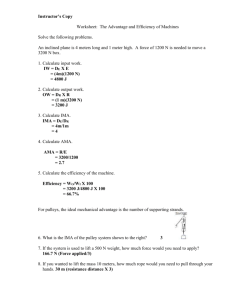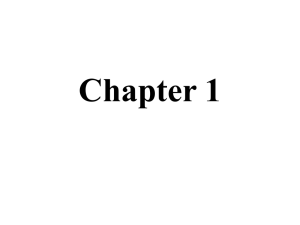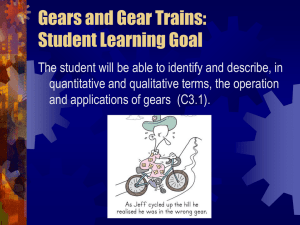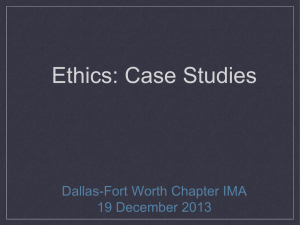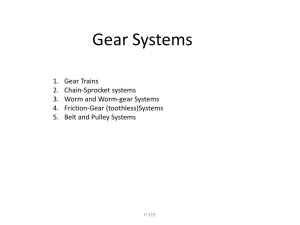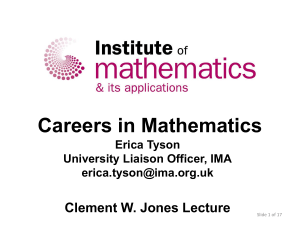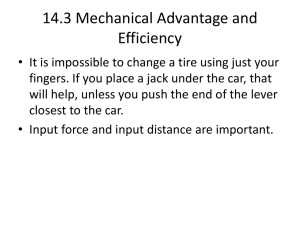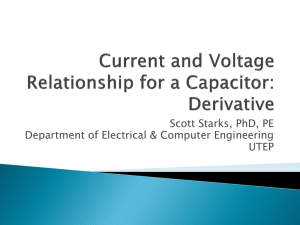Unit 1
advertisement
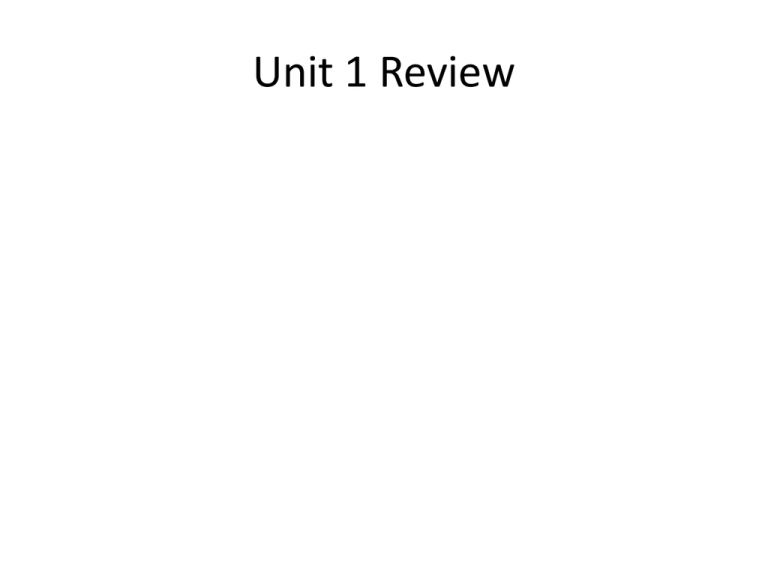
Unit 1 Review Simple Machines Simple machines comprise most mechanisms. Simple machines redirect energy by manipulating FORCE, DISTANCE and/or SPEED MA = R E R = Magnitude of resistance force E = Magnitude of effort force This is Actual MA Levers: Lever MA = LE LR Class 1 Levers: fulcrum is between the load and effort E R LE = length to effort LR = length to resistance Class 2 Levers: load is between the effort and fulcrum E R mechanical advantage >1 Class 3 Levers: effort is between the load and fulcrum R mechanical advantage < 1 E Moment = Force x Distance Moment Equilibrium: E * Le = R * Lr Not on formula sheet Problem What is my IMA? If I apply a force of 3 lbs, what is the load? 2” R 6” E Problem A. What is my MA? B. If I apply a force of 3 #, what is the load? 2” R A. MA = LE LR 6” MA = 8” 2” B. MA = R E MA = 4 4=R 3# R = 4 * 3# R = 12# E Wheel & Axle IMA This formula is different than formula sheet IM A = DE DR MA = R E Wheel and Axle If the 6” diameter axle on a car turns a 24” diameter wheel, what is the mechanical advantage? Wheel and Axle If the 6” diameter axle on a car turns a 24” diameter wheel, what is the mechanical advantage? MA = De/Dr MA= 6”/24” MA = 1/4 Effort on axle Pulley used to change the direction and magnitude of a force MA= # strands (only count last strand if it points up) AMA = FR FE Pulley The pulley system shown below is used to lift a load of 100 lbs. How much effort must be applied? If the rope travels 25’, how high does the load rise? Pulley The pulley system shown below is used to lift a load of 100 lbs. How much effort must be applied? If the rope travels 25’, how high does the load rise? MA = # strands = 5 MA = R/E 5 = 100 lbs/E E = 20 lbs MA = De/Dr 5 = 25’/Dr Dr = 5 feet Pulling on the rope. Effort travels 25’. Gear Ratios Change the speed of rotation Change the direction of rotation Change the amount of torque available to do work GR 1 n out n in d out d in in out out in This formula is different than formula sheet GR = gear ratio n = # of teeth d = diameter w = angular velocity (speed) T = torque Gears A input D output What is the gear ratio between gear A and B? What is the gear ratio between gear C and D? Gears A initial input D final output What is the gear ratio between gear A and B? GR = No /Ni GR = 12 T / 20 T GR = 0.6 What is the gear ratio between gear C and D? GR = No/Ni GR = 20T/5T GR = 4 Gear Ratios: Example Find gear ratio and find the input quantities given the following knowns: Driven Driver 75 ft-lb torque 30 rpm 6” GR = T in = d in = w in = 25Teeth 40Teeth Gear Ratios: Example Find gear ratio and find the input quantities given the following knowns: Driven Driver 75 ft-lb torque 30 rpm 6” GR = No/Ni = 40 T/25T = 1.6 GR = To/T in 1.6 = 75 ft-lb/Tin Ti = 46.9 ft-lb 25Teeth GR = do/d in 1.6 = 12 in / din D in = 7.5 in GR = W in/Wo 1.6 = Win/30 rpm Win = 48 rpm 40Teeth Compound Gear Train • Ratio of A to B times C to D A red 36 teeth B: blue 20 teeth C: yellow 28 teeth D: green 14 teeth Driver Find MA. If the output gear D is spinning at 10 revolutions per minute, how fast is the input gear a turning? Compound Gear Train A red 36 teeth B: blue 20 teeth C: yellow 28 teeth D: green 14 teeth GR = 20/36 * 14/28 GR = 0.28 MA = GR = No * No Ni Ni A to B C to D Not on formula sheet GR = Wi/Wo 0.28 = Wi / 10 rpm Wi = 2.8 rev per minute Inclined Plane IMA IM A = DE DR DE = Distance traveled by the effort = L DR = Distance traveled by the resistance = H IM A = L H What is the IMA of the inclined plane above? 4.0 ft Inclined Plane IMA IM A = DE DR DE = Distance traveled by the effort = L DR = Distance traveled by the resistance = H IM A = L H What is the IMA of the inclined plane above? IMA = 15.0 ft / 4.0 ft = 3.75 = 3.8:1 4.0 ft Wedge IMA DE DR DE = Distance traveled by the effort = L L 10.0 ft IM A = T 3.0 ft DR = Distance traveled by the resistance = T IM A = L T This formula is different than formula sheet What is the IMA of the wedge on the right? Wedge IMA DE DR DE = Distance traveled by the effort = L L 10.0 ft IM A = T 3.0 ft DR = Distance traveled by the resistance = T IM A = L T This formula is different than formula sheet What is the IMA of the wedge on the right? IMA = 10.0 ft / 3.0 ft = 3.33 = 3.3:1 Screw IMA IM A = Pitch is 1/ threads per inch 1/4 20 NC DE DR DE = One rotation of the effort arm = Circumference DR = Linear distance traveled during one rotation of the effort arm = Pitch IM A = C ircum ference P itch = 2πrE P What is the IMA of the screw above if effort is applied by an 8.0in. long wrench? Screw IMA 1/4 20 NC Pitch is 1/ threads per inch IM A = DE DR DE = One rotation of the effort arm = Circumference DR = Linear distance traveled during one rotation of the effort arm = Pitch IM A = C ircum ference P itch = 2πrE P What is the IMA of the screw above if effort is applied by an 8.0in. long wrench? IM A = 2 π8 .0 in 1 in 20 = 1 00 5 .3 1 = 1 .0 • 1 0 3 Energy Sources Energy Sources Energy: The ability to do work Energy Sources include – Nonrenewable • Fossil fuels • Uranium – Renewable • Animal • Food • biomass – Inexhaustible • • • • Hydroelectric/tidal Geothermal Wind Solar Work (W) The product of the force (F) applied to an object over a distance (d) in which the object travels as a result of the force (Force and distance must be parallel to each other) W F d Joule (j) is the base unit of work 1 joule 1new ton 1m eter J N m Power Rate at which work is performed or energy is expended P= W work time t Watt is the base unit of Power One watt is equal to 1 joule of work per second (or N-M per sec) Not on formula sheet 1 lb = 4.45 N and 1 ft = 0.305 m Mechanical Winch Power output: Work / time Power input: Voltage * current Efficiency = P out * 100 P in Not on formula sheet Project Example A motor lifts a 20 N weight a distance of 3 meters in 12 seconds. While lifting, voltage was recorded as 12V and current was 1.5 A. What is the motor’s efficiency? Project Example A motor lifts a 20 N weight a distance of 3 m in 12 seconds. While lifting, voltage was recorded as 12V and current was 1.5 A. What is the motor’s efficiency? Power output: Work / time: Work = Force * distance Power out = (20 N * 3 m)/12 sec = 5 N-m/s or 5 watts (must convert if given feet and lbs) Power input: Voltage * current Power in = 12V * 1.5 A = 18 watts Efficiency = P out * 100 = 5 watts/18 watts *100 = 27% P in Conservation of Energy Energy cannot be created or destroyed, but it can change from one form to another. Energy Conversion Changing one form of energy to another Energy Efficiency: The ratio of the useful energy delivered by a dynamic system to the energy supplied to it Entropy: The loss of energy during conversion o u tp u t E fficie n cy % in p u t x1 0 0 Electrical Circuit A system of conductors and components forming a complete path for current to travel Properties of an electrical circuit include Voltage (force (pressure) that causes current to flow) measured in Volts; symbol is V Current (flow of electric charge ) measured in Amps; symbol is A Resistance (opposition of current flow) measured in Ohms; symbol is Ω Ohm’s Law Quantities Abbreviations Units Symbols Voltage V Volts V Current I Amperes A Resistance R Ohms Ω V=IR Vt=ItRt For entire circuit For any component Circuit Configuration Series Circuits • Components are connected end-to-end. • There is only a single path for current to flow. Parallel Circuits • Both ends of the components are connected together. • There are multiple paths for current to flow. Components (i.e., resistors, batteries, capacitors, etc.) Circuits • Series • Parallel – Current same everywhere – Resistance adds to total resistance – Voltage adds to total voltage – Voltage same everywhere – Current adds to total current – total resistance (RT) is equal to the reciprocal of the sum of the reciprocal: 1 RT 1 R1 1 R2 1 R3 RT 1 1 R1 1 R2 1 R3 Example: Series Circuit For the series circuit shown, use the laws of circuit theory to calculate the following: • The total resistance (RT) • The current flowing through each component (IT, IR1, IR2, & IR3) • The voltage across each component (VT, VR1, VR2, & VR3) • Use the results to verify Kirchhoff’s Voltage Law. IT + VR1 - What is the current? IR1 + + VT VR2 IR2 - - IR3 RT - + VR3 Example: Series Circuit For the series circuit shown, use the laws of circuit theory to calculate the following: • The total resistance (RT) • The current flowing through each component (IT, IR1, IR2, & IR3) • The voltage across each component (VT, VR1, VR2, & VR3) • Use the results to verify Kirchhoff’s Voltage Law. Rt = 220 ohms+ 470 ohms +1200 ohms Rt = 1890 ohms IT + VR1 - IR1 + + VT VR2 IR2 - - IR3 RT - + VR3 Vt = It * Rt 12 V = It * 1890 ohms It = 0.006 amps Or, 6 mA Energy applications Energy applications • Look at the system. Understand the system energy requirements to select a proper energy source. O x yg e n H2 S to ra g e S o la r C e ll O x yg e n Fuel C e ll E le c tro lyze r W in d W a te r M icro h yd ro W a te r Hydrogen Fuel Cell: + Oxygen Electricity + Water CreatesHydrogen electricity andheat through electrochemical process that converts hydrogen and oxygen to water Water Fuel Cells Clean Modular Quiet Benefits of Fuel Cells Safe Sustainable Efficient Downside: not much voltage Thermodynamics The study of the effects of work, heat flow, and energy on a system Movement of thermal energy SURROUNDINGS SYSTEM BOUNDARY Thermal Energy (heat) Transfer The transfer or movement of thermal energy Most common types of transfer –Convection: movement of air –Conduction: movement thru an object through touching –Radiation: electromagnetic waves 100% efficiency is unattainable Calculating Energy Transfer P = Rate of heat transfer Q = Energy transfer U = U value Temp = temperature Q = P * change in time P = U * A * change in Temp Remember U value = 1/R value U value = The measure of a material’s ability to conduct heat Calculating Energy Transfer Calculate the energy transfer in a wall section measuring 8ft by 10 ft by 0.25 ft thick with an R value = 4 ft2 *oF * hr/BTU if the opposing sides of the wall section have a temperature of 90°F and 75°F after one hour. Area of thermal conductivity = U value = 1/ R value Difference in temperature = Q Calculating Energy Transfer Calculate the energy transfer in a wall section measuring 8ft by 10 ft by 0.25 ft thick with an R value = 4 ft2 *oF * hr/BTU if the opposing sides of the wall section have a temperature of 90°F and 75°F after one hour. Area of thermal conductivity = A = 8 ft * 10 ft = 80 ft2 U = 1/ R value = ¼ U value = 1/ R value = 0.25 BTU /ft2 *oF * hr Difference in temperature = ΔT = 90°F -75°F = 15°F P = U * A * change in Temp P = 0.25 BTU /ft2 *oF * hr * 80 ft2 * 15°F P = 300 BTU / hr Q = 300 BTU Q Design Problem Design Team A team is a collection of individuals, each with his or her own expertise, brought together to benefit a common goal. -Conduct research to develop knowledge base -Stimulate creative ideas -Make informed decisions What is a Design Process? A design process is a systematic problemsolving strategy, with criteria and constraints, used to develop many possible solutions to solve or satisfy human needs or wants and to narrow down the possible solutions to one final choice. – ITEA Standards for Technological Literacy Design Brief -defines the problem -concise document (no more than one page) -identifies the client - clearly states client’s problem -Lists specifications -Lists constraints The Adopted Design Process for PLTW® Courses 1. 2. 3. 4. 5. 6. 7. 8. 9. 10. 11. 12. Define a problem Brainstorm Research and generate ideas Identify criteria and specify constraints Explore possibilities Select an approach Develop a design proposal Make a model or prototype Test and evaluate the design using specifications Refine the design Create or make solution Communicate processes and results – ITEA Standards for Technological Literacy 1. Define a Problem • Receive a problem to solve from the client. • Gather information. • Be inspired through media exposure of a current problem and take action. 2. Brainstorm • Generate and record ideas. • Keep the mind alert through rapidly paced sessions. • Develop preliminary ideas based on constraints. 3. Generate and Research Ideas •Conduct interviews with those affected by the problem. •Research solutions that may already exist; identify shortcomings and reasons why they aren’t appropriate to a given situation. •Compile ideas and report findings to the team. •Generate and Compile the ideas 4. Identify Criteria and Specific Constraints •Limitations •Cost •Identify what the solution should do and the degree to which the solution will be pursued. •Identify constraints (i.e., budget, time, etc.). •Draft the Design Brief. •Time 5. Explore Possibilities • Consider further development of brainstorming ideas with constraints and tradeoffs. • Explore alternative ideas based on further knowledge and technologies. 6. Select an Approach • Review brainstormed information and answer any lingering questions. • Narrow ideas down through a voting process, or by use of a decision matrix. • Decide on final idea, usually through group consensus. 7. Develop a Design Proposal •Explore the idea in greater detail with annotated sketches. •Make critical decisions such as material types and manufacturing methods. •Generate through computer models detailed sketches to further refine the idea. •Produce working drawings so the idea can be built. •Generate Design •Create working drawings 8. Make a Model or Prototype •Make models to help communicate the idea and to study aspects such as shape, form, fit, or texture. •Construct a prototype from the working drawings so that the solution can be tested. BUILD! Prototype Creation 9. Test and Evaluate the Design Using Specifications •Design experiments and test the prototype in controlled and working environments. •Gather performance data; analyze and check results against established criteria. •Conduct a formal critique to flesh out areas of concerns, identify shortcomings, and establish any need for redesign work. •Prototype Testing •Trial Runs 10. Refine the Design •Make design changes; modify or rebuild the prototype. •Make refinements until accuracy and repeatability of the prototype’s performance results are consistent. •Update documentation to reflect changes. •Receive user’s critique to provide outside perspective in order to determine whether established criteria have been met. •Modify design •Rebuild prototype 11. Create Solution 12. Communicate Processes and Results •Communicate the designer’s final solution through media such as PowerPoint, poster session, technical report. •Market the Product. •Distribute.
